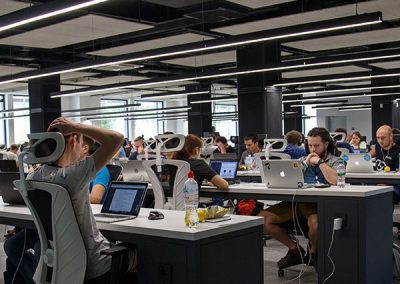Smart Cities and Regions
Background – Key drivers shaping the digital future
It is increasingly acknowledged that ‘smart place strategies’ start with people – not technology. The relations between people and place and the changing dynamics between where we live and work are playing an increasing role in transforming the quality and offerings of ‘place’. This became particularly evident during the global coronavirus pandemic and associated restrictions on movement. Unsurprisingly, place-making is playing a much more significant role in policy and practice affecting social, economic and environmental development than ever before – evidenced in Ireland 2040 – National Planning Framework (2018), Our Rural Future (2021), the Regional Spatial and Economic Strategies (2019-2020) and the current reviews of the County Development Plans by local authorities. Operationally, this requires tapping into place-based knowledge, local passion and emotional resilience, and strong civic leadership.
The process of place-making is not confined to cities and regions – but to settlements of all sizes. Determining what a place-based strategy should focus on starts with identifying what the location provides in terms of key resources, services and growth opportunities that shape day-to-day-life and economic opportunities and increasingly, quality of life assets. For policymakers, this raises questions around innovation and creativity in the spheres of socio-economic, cultural and environmental development and governance and increasingly, the role of digital. It also demands access to quality data – at various scales – to enable us to identify trends and patterns and ensure future policies are clearly evidence-informed. Critical factors impacting on the future of place include:
- Climate Change and the necessity for mitigation, adaptation and just transition;
- Sustainable Development Goals (SDGs) and the growing need to build sustainable and resilient communities;
- Changing demographics and the growing need to plan for an ageing community – with digital playing a significant role in enhancing quality of life and social connectedness; and
- Data and digitalisation and acknowledging places as socio-technical and cyber-physical systems.

CHALLENGES AND IMPACT
There are many examples of where cities and regions have trialled the use of digital technologies and innovations to solve the range of challenges they face. These have tended to be ‘one-off’ initiatives that are not designed to examine the challenge in-situ or in its wider context. This has hampered the formation of sustainable ecosystems. Drawing lessons from global initiatives to date, the adoption of the quadruple helix of engagement and collaboration, involving all ecosystem stakeholders from the public sector, research, industry and community across cities and regions, in essential in developing sustainable solutions that are tailored, holistic, and embedded in place. Places are complex socio-technical systems that encompass a diverse range of needs, objectives and societal aspects. Digitalisation and data, together with planning tools such as the Place Standard, are critical infrastructures in building resilient and responsive places – in understanding current trends and perspectives but also in establishing baselines and future goals. Sustainable solutions that place an emphasis on citizens must, therefore, be complemented by corresponding service and business models in the context of limited access to public funding.
RESEARCH FOCUS
With this Research Cluster we aim to build future places that that liveable, vibrant, smart and resilient utilising planning, design, data, digitialisation tools and social innovations. Digital technologies, data and various planning tools and innovative solutions are, for example, offering transformation paths for places that are integrated into a set of validated transformation paths, which can be piloted and validated in real world projects. Co-design and building collaborative stakeholder ecosystems are necessary to facilitate effective transformation paths that consider both the interdisciplinary and multi-stakeholder environment in place-making. This will transform our cities, towns and regions into vibrant and liveable areas, underpinned by sustainable economic growth and innovation.
COLLABORATION OPPORTUNITIES
Through multi-disciplinary teams working with the Innovation Value Institute (IVI), the All-Ireland Smart Cities Forum and the International Centre for Local and Regional Development (ICLRD), this Research Cluster has many years of experience in developing, in partnership with key stakeholders, innovators and solution providers, innovative results for sustainable and resilient places. The Research Cluster is aiming to facilitate and lead innovations to support the (digital) transformation of places – urban, rural and regional – and to provide advice. In cooperation with partners from industry, society, administration and politics, the Research Cluster will facilitate the formation of sustainable ecosystems.
…At the Innovation Value Institute, we aim to develop validated transformation paths in partnership with many stakeholders, to support digital transformation in the public sector. Our Methodology assist to consider, organize and describe the various elements, stakeholders’ views, goals, considerations, factors and components, and IT applications as well as constraints by facilitating the transformation and digitization of public services….
Meeting the Challenge
To meet the challenges of developing sustainable and resilient places, the Innovation Value Institute, working in partnership with policy-makers and/or practitioners, in analysing, developing, scenario planning and piloting solutions in (re)imagining the future of places will help to develop sustainable business models and strategies and examine approaches and technologies through:
1. Building connectivity between various policy environments;
2. Elaborating on connectivity between policy environments and (digital) place-making;
3. Incorporating new scenarios / solutions into planning policy and practice, and their subsequent implementation; and
4. Supporting the governance arrangements necessary to advance place-making agendas.

Research Agenda
- Develop strategies (resilient, digital, etc.) and sustainable development models that support effective place-making.
- Working with places on their transformation towards sustainability and resilience.
- Consider the implications of emerging technologies and digital innovations in place-making.
- Supporting places in their just, green and digital transitions.
- Investigate the role of digital innovations in building solutions to global challenges locally.
- Work with places to harness the benefits of digitalisation to deliver balanced and sustainable development and well-being.
- Envision the role of digitalisation in the delivery of the SDGs locally.
- Examine approaches to increase citizen engagement and experience.
- Investigate how data and technologies can be used to provide innovative services.
- Catalogue good practice in digital place-making.
List of Publications:
Scientific Publications
- Helfert, Markus; Bastidas, Viviana; Pourzolfaghar, Zohreh Digital and Smart Services-The Application of Enterprise Architecture In proceedings International Conference on Digital Transformation and Global Society, pp. 277–288, Springer, Cham 2018.
- Pourzolfaghar, Zohreh; Bastidas, Viviana; Helfert, Markus, Standardisation of enterprise architecture development for smart cities, Journal of the Knowledge Economy, 10 , pp. 1–22, 2019.
- Mamkaitis, Aleksas; Bezbradica, Marija; Helfert, Markus, Urban enterprise: a review of smart city frameworks from an enterprise architecture perspective Inproceedings, 2016 IEEE International Smart Cities Conference (ISC2), pp. 1–5, IEEE 2016.
Researchers:

Caroline Creamer

Professor Markus Helfert










